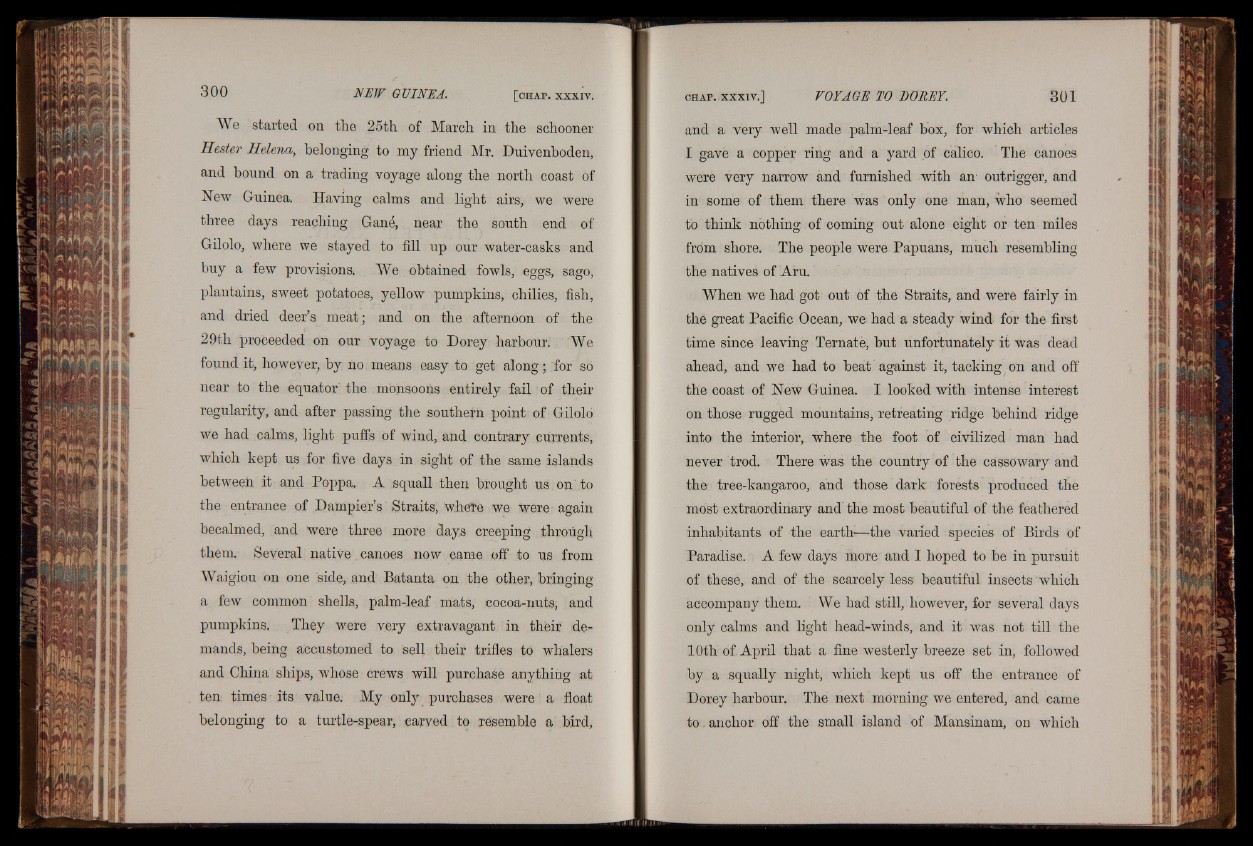
We started on the 25th of March in the schooner
Hester Helena, belonging to my friend Mr. Duivenboden,
and bound on a trading voyage along the north coast of
New Guinea. Having calms and light airs, we were
three days reaching Gané, near the south end of
Gilolo, where we stayed to fill up our water-casks and
buy a few provisions. We obtained fowls, eggs, sago,
plantains, sweet potatoes, yellow pumpkins, chilies, fish,
and dried deer’s meat; and on the afternoon of the
29th proceeded on our voyage to Dorey harbour. We
found it, however, by no means easy to get along; .for so
near to the equator the monsoons entirely fail of their
regularity, and after passing the southern point of Gilolo
we had calms, light puffs of wind, and contrary currents,
which kept us for five days in sight of the same islands
between it and Poppa, A squall then brought us on to
the entrance of Dampier’s Straits, where we were again
becalmed, and were three more days creeping through
them. Several native. canoes now came, off to us from
Waigiou on one side, and Batanta on the other, bringing
a few common shells, palm-leaf mats, cocoa-nuts, and
pumpkins. They were very extravagant in their demands,
being accustomed to sell their trifles to whalers
and China ships, whose crews will purchase anything at
ten times its value. My only purchases were a float
belonging to a turtle-spear, earyed to resemble a bird,
and a very well made palm-leaf box, for which articles
I gave a copper ring and a yard of calico. The canoes
were very narrow and furnished with an- outrigger, and
in some of them there was only one man, who seemed
to think nothing of coming out alone eight or ten miles
from shore. The people were Papuans, much resembling
the natives of Aru.
When we had got out of the Straits, and were fairly in
thé great Pacific Ocean, we had a steady wind for the first
time since leaving Ternatè, but unfortunately it was dead
ahead, and we had to beat against it, tacking on and off
the coast of New Guinea. I looked with intense interest
on those rugged mountains, retreating ridge behind ridge
into the interior, where the foot of civilized man had
never trod. There was the country of the cassowary and
the tree-kangaroo, and those dark forests produced the
most extraordinary and the most beautiful of the feathered
inhabitants of the earth—the varied species of Birds of
Paradise. A few days more and I hoped to be in pursuit
of these, and of the scarcely less beautiful insects which
accompany them. We had still, however, for several days
only calms and light head-winds, and it was not till the
10th of April that a fine westerly breeze set in, followed
by a squally night, which kept us off the entrance of
Dorey harbour. The next morning we entered, and came
to ï anchor off the small island of Mansinam, on which